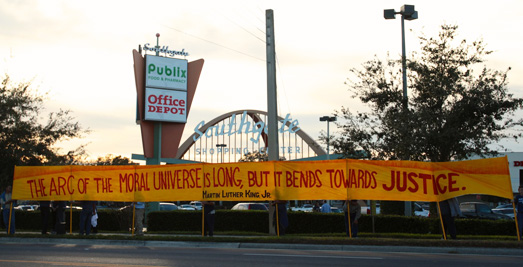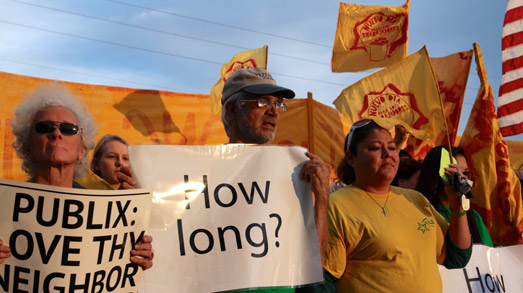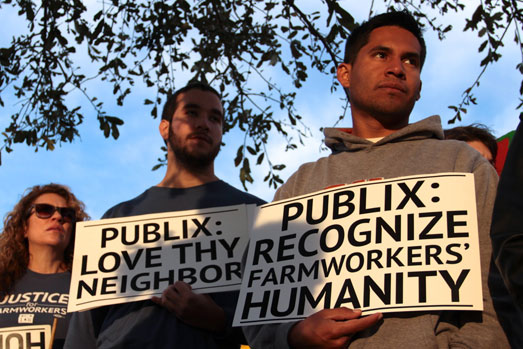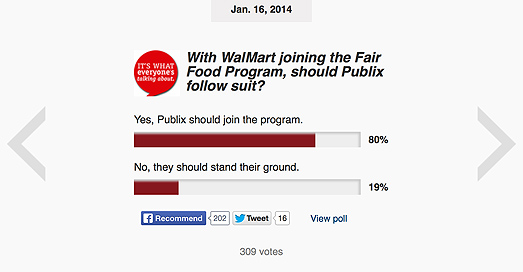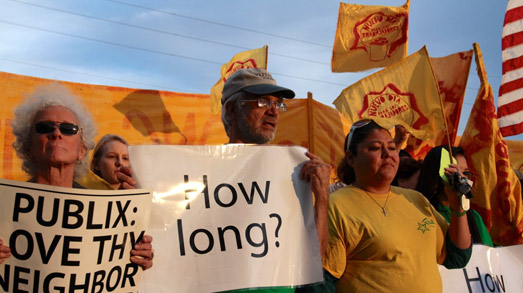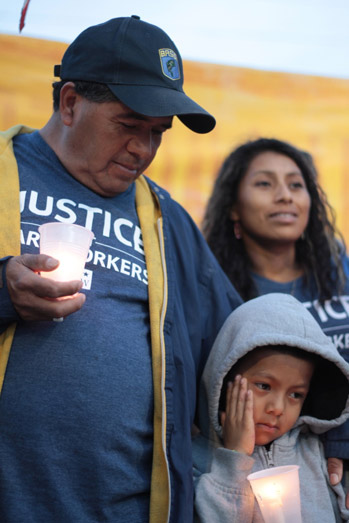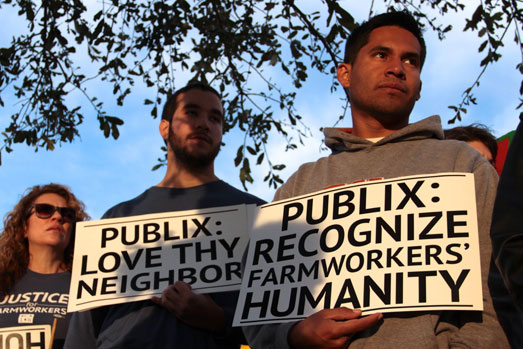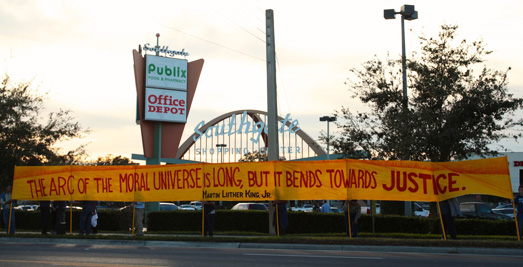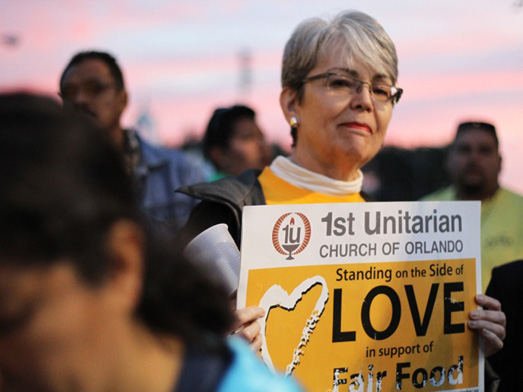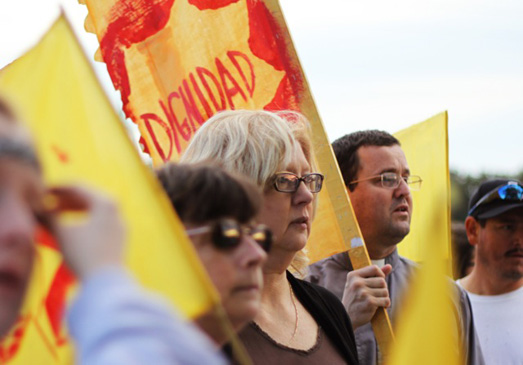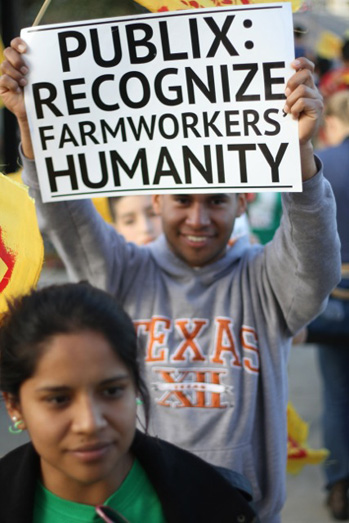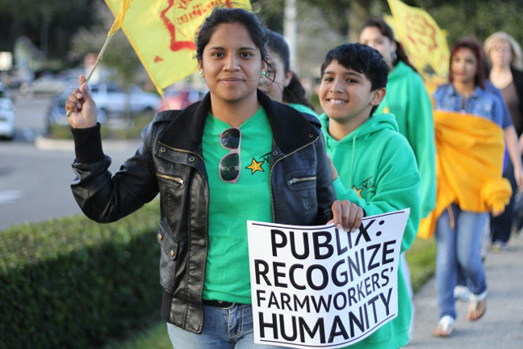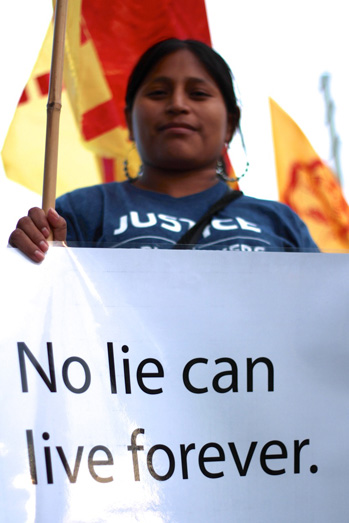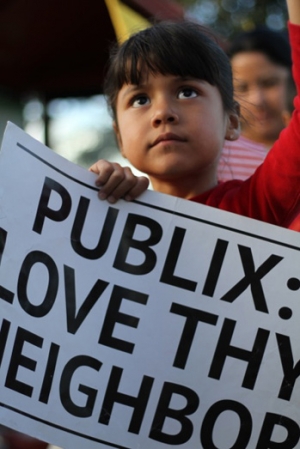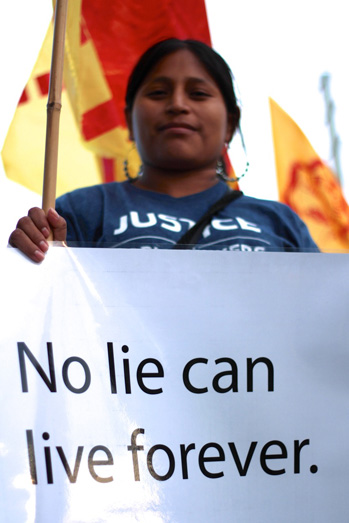 Over 100 farmworkers and allies hold moving vigil outside flagship Publix store in Lakeland in wake of Walmart agreement;
Over 100 farmworkers and allies hold moving vigil outside flagship Publix store in Lakeland in wake of Walmart agreement;
Tampa Bay Times editorial: “With Whole Foods, Trader Joe’s and Wal-Mart now participating in the program, there is no reason Publix should not join its grocery competitors in helping to raise pay and improve working conditions in Florida’s tomato fields.”
Following last week’s announcement of the CIW’s historic agreement with Walmart, scores of CIW members climbed into vans and caravanned north this past Monday to join forces with dozens of allies for a spirited protest and candlelight vigil outside of Publix’s flagship Southgate store in the heart of the grocery giant’s hometown of Lakeland, Florida.
The vigil took place on Martin Luther King Day and took as its theme one of Dr. King’s most prophetic quotations: “The arc of the moral universe is long, but it bends toward justice.” Protesters held a 60-ft long banner with Dr. King’s words (a banner that debuted last year during this unforgettable protest) along the sidewalk that runs in front of the Southgate store, while farmworker families joined with Fair Food activists from across central Florida to drive home the true meaning of the holiday, demanding long overdue justice and respect for human rights from Florida’s largest corporation.
In a moving echo of Dr. King’s patient but unflagging commitment to civil rights and economic justice, the protesters asked “How long?” until Publix would heed the ever-growing demand for human rights in the fields and join the Fair Food Program; “How long?” until Publix would end its public relations shell game of ever-shifting justifications for resisting inevitable progress; “How long?” until Publix would realize that, in the age of information and instant communication, no lie can live forever. The answer, just as it was fifty years ago when bitter segregationists fought to hold on to the dying structures and privileges of legal racial discrimination, was “Not Long.”
Monday’s vibrant protest and vigil were a fitting tribute to Dr. King and a perfect statement on this historic moment, following the Walmart agreement, in the long arc of progress traced by the struggle for human rights launched twenty years ago in Immokalee. Be sure to take a few moments to view the video below, which beautifully captures the spirit of the action, and then check out some truly stunning photographs from the day’s events in the gallery that follows at the end of today’s post:
Video
Tampa Bay Times editorial
Meanwhile, the Tampa Bay Times, one of Publix’s two hometown papers and one of the largest and most respected papers in the state, published an editorial on Tuesday that expresses the thoughts and hopes of many, many Floridians — and Publix customers — following last week’s announcement of the CIW’s groundbreaking agreement with Walmart. Here below is the editorial in its entirety (it is too good to excerpt):
For years, the Coalition of Immokalee Workers has battled to get better pay and working conditions for tomato pickers. The coalition’s persistence brought gradual success, as fast food chains and finally Florida growers signed on to the agreement to pay laborers a penny-per-pound premium. Last week, the coalition won its biggest victory: Wal-Mart, the nation’s largest retailer, joined the effort. It is a credit to the coalition’s perseverance and the retailer’s vision, and it could one day benefit workers in the fields in other states and those picking other crops.
Under the coalition’s Fair Food Program, tomato growers in Florida agree to pass on to their customers a pay increase for farmworkers of a penny per pound of tomatoes picked. The growers also agree to have no tolerance for sexual assault or forced labor, create a system for resolving labor disputes with workers, and establish health and safety committees at each farm. The coalition kept up the pressure on food chains when the growers refused to bend, resulting in a nationwide boycott of Taco Bell that persuaded that chain to sign on in 2005. Five years later, the Florida Tomato Growers Exchange agreed to the conditions in the Fair Food Program, and now 90 percent of the state’s growers are taking part.
The coalition says the penny-per-pound initiative has increased workers’ wages by $11 million since January 2011 and significantly improved working conditions in Florida’s tomato fields. Among the participants in the program: the nation’s four largest food service providers and the four largest fast food companies (McDonald’s, Burger King, Subway and Yum Brands — whose chains include Taco Bell, KFC and Pizza Hut). Most of Wal-Mart’s suppliers already participate in the program, but the retailer’s agreement to join the effort should produce more benefits.
The remaining suppliers of Wal-Mart’s tomatoes will have to agree to the program’s terms or lose the business. The pressure to do the right thing should increase on other holdouts such as Publix super markets, which was not swayed by the coalition’s two-week march last year to the company’s headquarters in Lakeland. And Wal-Mart could use its clout to one day extend the Fair Food Program to tomato growers in other states and to other crops.
With Whole Foods, Trader Joe’s and Wal-Mart now participating in the program, there is no reason Publix should not join its grocery competitors in helping to raise pay and improve working conditions in Florida’s tomato fields. The Coalition of Immokalee Workers has demonstrated that determination, organization and public outreach can make a real difference in improving the lives of workers who are performing backbreaking work to feed America. Adding Wal-Mart to the effort will pay huge dividends, but there is more work to do.
The writing is on the wall. The Fair Food Program has become the industry standard for the protection of human rights in Florida’s tomato fields, and, based on its unparalleled and widely-recognized success, is today poised to expand beyond those fields, and beyond tomatoes, to improve the lives of countless more workers. The days of hoping that the Fair Food Program’s progress might be stopped — that the clock’s hands might be turned back and that the consumer awareness propelling the advances in farmworkers’ rights might somehow fade away — are gone. Perhaps no image better captures that fact than this snap poll, taken by the Ft. Myers News-Press following last week’s announcement:
Companies like Publix and Wendy’s are part of a shrinking crowd of old guard food companies standing on ground that is fast eroding under the constant and rising tide of consumer demand for genuine transparency and a demonstrable commitment to the highest ethical standards behind the food they buy. The Fair Food Program delivers on that demand.
“How long?,” asked Dr. King fifty years ago. “Not long,” was the answer then. And not “Not long” is the answer today, too.
Gallery

